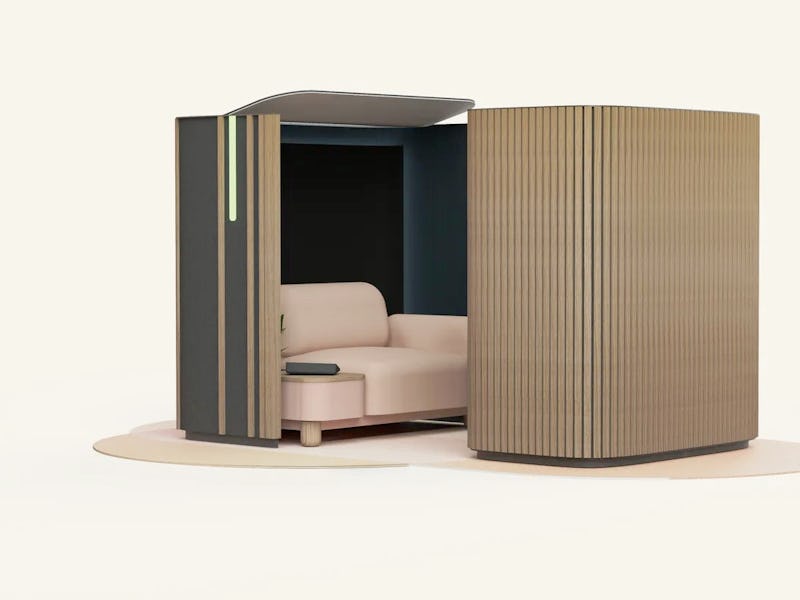Logitech is Trying to Reinvent Video Calls Using an Optical Illusion
Project Ghost, a new telepresence concept Logitech is building with Steelcase, relies on the "Pepper's ghost" illusion to make video calls feel more like in-person conversations.

Big Tech is trying to reinvent the video call. Project Ghost, a new telepresence booth concept Logitech is demoing at the Integrated Systems Europe (ISE) conference in Barcelona this week, is just the latest proposal for how we can add a sense of presence and attention to boring conferences and meetings, but one that seems simple enough that it could pop up in offices near you.
Google started the push for better video conferencing in earnest with its high-tech Project Starline demo from last year’s I/O developer conference, and Logitech’s intentions seem similar. Remote work has continued to blossom during the pandemic, but now that businesses want workers to return to in-person work, there both needs to be an incentive to go back in person and a better way to bridge the gap between employees you don’t work with directly.
Eye contact and depth
Project Ghost looks like a comfortable sitting room with a video screen on one side.
The main focus of Logitech’s concept is maintaining eye contact between you and the person you’re talking to while creating the illusion that they could be in the same room. Logitech uses the speakers, microphones, cameras, and displays from its more traditional Rally Plus teleconferencing kit, but combines them in a housing with extra glass to create a simple hologram.
If you’ve ridden the Haunted Mansion ride at Disneyland, Logitech’s booth works in a similar way. Project Ghost relies on the “Pepper’s ghost” illusion to make it seem like the person you’re talking to is in the booth across from you rather than streaming in on a 2D display, by reflecting the screen of glass placed at an angle. The resulting image is ghost-like, but with more presence than a flat Zoom window. Logitech takes things a few steps further by hiding its webcam behind the glass so you maintain eye contact with whoever you’re talking to and dressing everything up in Steelcase’s modern and comfortable furniture sensibilities, but the basic effect is the same.
The “Pepper’s ghost” illusion is one of the oldest visual effects, and one still put into regular use.
The simplicity of Logitech’s setup means there are other possible use cases for Project Ghost. For the right store, I could imagine a remote customer service agent, retail employee, or bank teller could work entirely remote.
Google’s Project Starline tries to capture that same feeling of presence in a more overly-engineered way, relying on depth sensors, multiple cameras, and a light field display to create video calls with depth and volume. Based on press demos of Google’s booth it certainly sounds like the more impressive option of the two, but given its complexity, it might not be entirely practical save for the most high-end of corporate offices. And where does that leave permanently remote video callers?
How important is presence?
Meta’s Horizon VR applications try to recreate the feeling of socializing in person.
The appeal of one of these telepresence booths is clear. It’s more satisfying and natural to talk to someone in-person and much easier to pay attention to. I don’t think anyone benefits from being in wall-to-wall meetings, but there’s a real sense that something like Project Ghost or Starline could at least make that experience more enjoyable. But those qualities aren’t a necessity for collaborating or socializing with someone virtually.
The current push towards mixed-reality headsets and the metaverse gets at a similar itch. The basic idea is that the next way people should connect digitally should have a sense of presence, place-ness, and tactility. Maybe the remote worker gets their telepresence fix through FaceTime on a rumored $3,000 mixed-reality headset from Apple, or Horizon Workrooms on Meta’s $1,500 Quest Pro. But more than likely cost will be the main thing that keeps telepresence booths as more of an incentive to return to the office than a glimpse of how we could all work remotely in the future. A novel idea, but not yet an entirely realistic one.